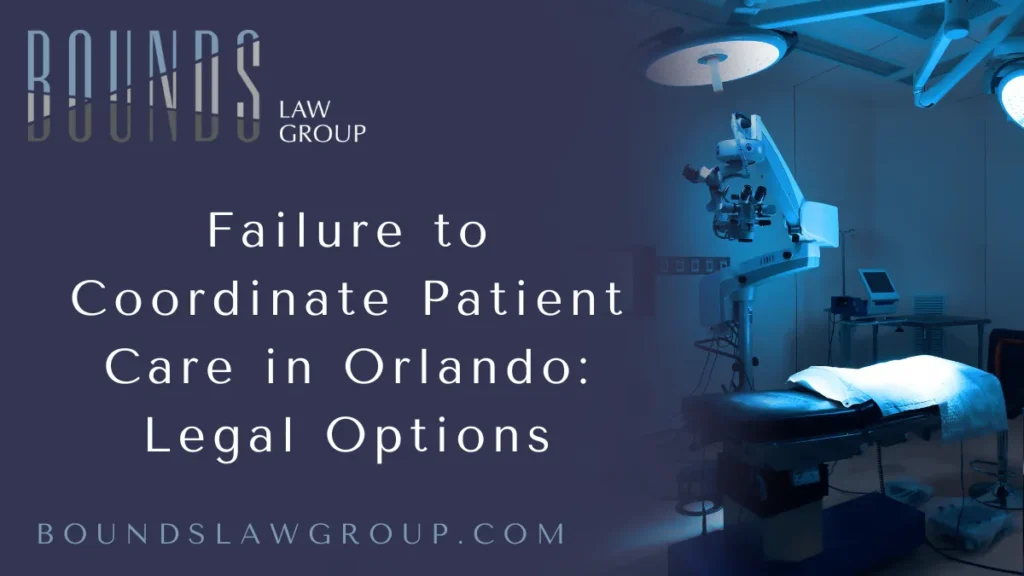
Orlando Care Coordination Negligence
Orlando care coordination negligence refers to the failure of medical professionals and healthcare institutions to effectively communicate and manage a patient’s treatment across various providers. This negligence can lead to serious consequences—delayed diagnoses, medication errors, repeated procedures, or even wrongful death. At Bounds Law Group, we have seen firsthand how devastating a lack of care coordination can be for families in Central Florida. When hospitals, clinics, or physicians fail to collaborate or document essential information properly, patients suffer—physically, emotionally, and financially.
Contact us today through our free case evaluation form or call 877-644-5122.
What is Care Coordination in the Healthcare System?
Care coordination is the deliberate organization of patient care activities between multiple providers involved in a patient’s treatment. It includes the sharing of accurate patient information and ensuring that all medical services are timely, appropriate, and well-communicated.
When properly executed, care coordination reduces hospital readmissions, improves outcomes, and enhances patient satisfaction. However, when it breaks down, Orlando care coordination negligence occurs—leading to preventable harm.
Common areas where care coordination fails include:
- Failure to transmit test results
- Discharge planning errors
- Gaps between primary care and specialists
- Miscommunication between nursing staff and physicians
- Incomplete medical records

Consequences of Orlando Care Coordination Negligence
When healthcare providers neglect coordination, the fallout can be life-altering. We’ve represented clients whose lives were changed due to:
- Delayed or incorrect diagnoses
- Unmanaged chronic conditions
- Adverse drug interactions
- Unnecessary surgical procedures
- Worsening of injuries or illnesses
These errors are preventable and rooted in systemic failures—not patient error. Victims of Orlando care coordination negligence often face prolonged recovery, permanent disability, or significant emotional trauma.
Who is Liable for Care Coordination Failures?
Liability in Orlando care coordination negligence cases may fall on several parties:
- Hospitals or medical facilities that fail to implement proper protocols
- Primary care physicians who do not communicate vital patient information
- Specialists who ignore prior evaluations or fail to follow up
- Nurses or medical staff who incorrectly document or relay treatment instructions
- Electronic Health Record (EHR) vendors if system errors contributed to the miscommunication
Determining liability in these complex cases requires deep legal and medical knowledge—something Bounds Law Group has cultivated through years of handling medical negligence lawsuits in Orlando and across Florida.
Legal Options for Victims of Orlando Care Coordination Negligence
Victims have the legal right to pursue compensation when harmed by Orlando care coordination negligence. At Bounds Law Group, we help our clients understand and assert their rights under Florida medical malpractice laws.
Compensation may include:
- Medical expenses (past and future)
- Lost wages and loss of earning capacity
- Pain and suffering
- Mental anguish
- Punitive damages in extreme cases
We meticulously investigate every case, gathering medical records, expert testimony, and institutional policies to build a compelling argument on your behalf.
How We Prove Negligence in Orlando Care Coordination Cases
In Florida, to win a medical malpractice claim for Orlando care coordination negligence, four key elements must be proven:
- Duty of Care – A provider-patient relationship existed.
- Breach of Duty – The provider failed to deliver the accepted standard of care.
- Causation – The breach directly caused harm to the patient.
- Damages – The patient suffered actual injuries or losses.
We work with seasoned medical experts to evaluate every detail of your case. Our deep understanding of the complexities surrounding inter-provider communication and hospital protocols allows us to uncover negligence that others might overlook.
Statute of Limitations in Florida Medical Negligence Cases
In Florida, victims of Orlando care coordination negligence generally have two years from the date they discovered, or should have discovered, the harm. However, this timeframe can vary depending on the specifics of each case. Failing to act in time could permanently bar you from seeking justice.
This is why contacting an experienced attorney at Bounds Law Group as soon as possible is critical.
Why Choose Bounds Law Group
We are one of Florida’s premier medical malpractice law firms, dedicated exclusively to representing victims—not hospitals or insurance companies. Our team understands the highly technical nature of healthcare communication breakdowns and uses that expertise to hold negligent parties accountable.
What sets Bounds Law Group apart:
- Proven success in complex medical malpractice litigation
- Deep knowledge of healthcare systems and hospital operations
- Access to top-tier medical experts for case reviews
- Compassionate representation with personalized attention
- No fee unless we win your case
We’re here to help you navigate this legal process with confidence and dignity.
Take Action Today — Don’t Wait Until It’s Too Late
If you or a loved one has been harmed due to Orlando care coordination negligence, don’t face the aftermath alone. The consequences of medical miscommunication can be severe, but you have legal recourse.
Complete our free case evaluation form or call us now at 877-644-5122 to speak directly with a seasoned attorney at Bounds Law Group. We are ready to investigate your claim and fight for the justice you deserve.

Preventing Orlando Care Coordination Negligence: What Healthcare Providers Should Be Doing
While our primary focus at Bounds Law Group is helping victims pursue justice, it's equally important to highlight what should be happening within healthcare institutions to prevent Orlando care coordination negligence from occurring in the first place.
Healthcare facilities and providers have both ethical and legal obligations to establish systems that promote seamless coordination. Preventive measures include:
- Integrated Electronic Health Records (EHRs): All providers involved in a patient’s care must have access to a centralized system to review patient history, lab results, prescriptions, and treatment plans. Fragmented or outdated systems are a root cause of many communication breakdowns.
- Clear Handoff Protocols: Transitions between shifts, departments, or providers must include comprehensive handoff reports. Standardized checklists and read-back procedures help ensure no critical information is lost during transitions.
- Team-Based Care Models: Hospitals should implement interdisciplinary care teams that meet regularly to review patient status, update treatment goals, and address coordination challenges.
- Patient-Centered Communication: Providers must include patients and their families in the conversation. Educating patients on their conditions, medications, and follow-up instructions reduces the risk of confusion and noncompliance.
- Ongoing Training and Audits: Regular training for medical staff on care coordination standards, HIPAA compliance, and communication strategies, combined with internal audits, can identify gaps and prevent harm before it happens.
Unfortunately, many facilities fail to take these proactive steps. When that failure results in patient harm, legal accountability is not only possible—it’s essential.
If you or someone you care about was harmed due to preventable lapses in medical communication, complete our free case evaluation form or call us now at 877-644-5122 to discuss your case with Bounds Law Group. We are ready to stand with you and hold negligent healthcare providers accountable.
Sources
- Agency for Healthcare Research and Quality (AHRQ) – Offers research and resources on improving patient safety and care coordination.
https://www.ahrq.gov - National Academy of Medicine – Provides detailed reports on the role of communication in patient safety.
https://nam.edu - Florida Statutes – Medical Malpractice Law – The official legal framework governing negligence and malpractice in Florida.
http://www.leg.state.fl.us

